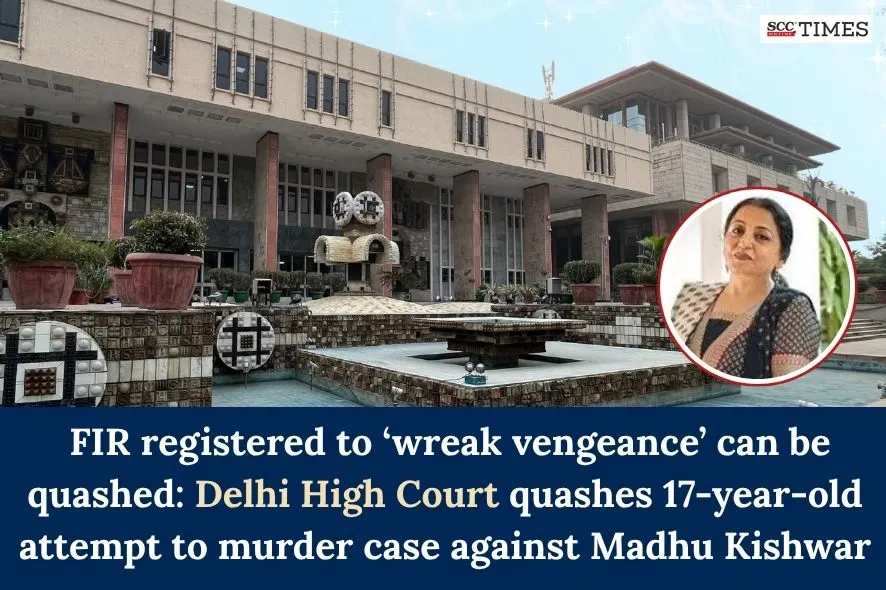Disclaimer: This has been reported after the availability of the order of the Court and not on media reports so as to give an accurate report to our readers.
Delhi High Court: In the present case, a petition was filed by the petitioner for quashing of FIR under Sections 307, 323, 506 and 34 of the Penal Code, 1860 (‘IPC’) filed subsequent to a registered FIR, which resulted in conviction of the complainant-Respondent 4, for wreaking vengeance upon him. A Single Judge Bench of Amit Mahajan, J., held that while FIR should ordinarily not be quashed at the inception when there were disputed questions of fact, however, it is settled law that this Court was empowered to quash the FIR when the record suggested that the same had been registered to wreak vengeance. Thus, the Court quashed the said FIR.
Background
An FIR was registered against the petitioner for the offences under Sections 307, 323, 506 and 34 of the IPC alleging serious injuries sustained by the complainant, her son and grandson as the petitioner’s driver had had hit the complainant with the car and then he had beaten them. The complainant had gone to the petitioner demanding the return of money that had been taken for allotment of shops.
Previously, an FIR was registered against the complainant under Sections 147, 149, 341, 323, 509 and 506 of the IPC alleging that when the petitioner along with some volunteers had reached the market and started clicking some photographs, the complainant came in front of the camera again and again to start a fight and when the petitioner moved towards her car, she kicked her from behind into the drain in front of the park and pulled her hair. Thereafter, the complainant’s son began beating the petitioner and his driver.
It was submitted that the petitioner was authorized to monitor civil discipline in the area concerned and to report the unauthorized construction. It was further submitted that a certain area had been taken over illegally by a gang which was headed by the son of the complainant, due to which, she had a vested interest against the petitioner.
The 2007-FIR was stayed in 2008, however the proceedings in the cross-FIR continued, and the Trial Court convicted the complainant citing that the material on record showed that the complainant had actively participated in the use of criminal force against the petitioner, with an object to prevent him from clicking photographs and from obstructing the accused persons illegal encroachment.
Analysis and Decision
The Court stated that while FIR should ordinarily not be quashed at the inception when there were disputed questions of fact, however, it is a settled law that this Court was empowered to quash the FIR when the record suggested that the same had been registered to wreak vengeance. Further, the Court observed that where the accused sought quashing of FIR essentially on the ground that the proceedings were vexatious, the Court was required to look more closely into the FIR and to appreciate the attending circumstances emerging from the record of the case as well with due care and circumspection.
The Court opined that the FIR in question was registered after the registration of FIR on a complaint given by the petitioner and the judgement passed by the Trial Court clearly indicated that the complainant was at fault and thus, the FIR in question appeared to be in the nature of defense and a maliciously motivated retaliation of the previous FIR for wreaking vengeance upon the petitioner.
The Court noted that both the FIRs pertained to the same incident, and the conviction of the complainant appeared to have attained finality. Therefore, setting the criminal law machinery in motion only for the reason that the complaint disclosed commission of cognizable offence would be an abuse of the process of the court. The Court further observed that even if the allegations of the complainant were taken at the highest, considering the complainants conviction in a case arising out of same incident, the same could at best be considered as a self-defense or an altercation at the stage when the complainant had formed an unlawful assembly and caused injuries to the petitioner and another person when they were carrying out certain functions assigned to them. Thus, the Court allowed the petition at hand.
[Prof. Madhu Kishwar v. State(NCT of Delhi), 2025 SCC OnLine Del 7136, decided on 16-10-2025]
Advocates who appeared in this case:
For the Petitioner: Ravi Sharma, Shivam Mishra and Madhulika Rai Sharma, Advocates
For the Respondent: Priyanka Dalal, APP for the State with Insp. Chandra Prakash, DIU/South Distt.



